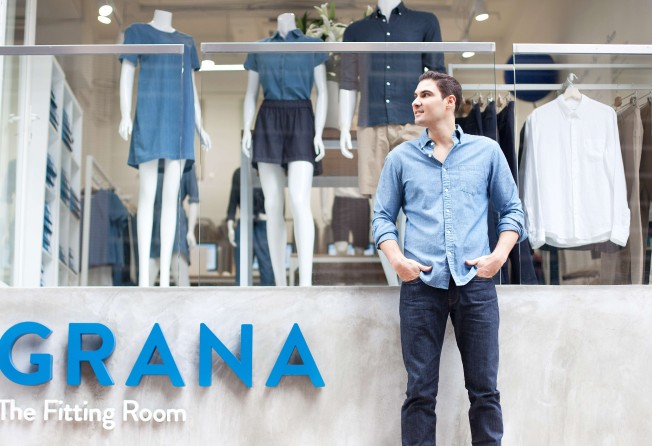
Are pop-up stores the answer for Hong Kong’s struggling retailers?
Online retailers are increasingly taking up short-lease space to increase the visibility and awareness of their brands

A new rental strategy is taking root among Hong Kong’s retailers, as they battle for survival in an industry squeezed by 17 consecutive months of shrinking volumes and retail rents that are among the highest in the world.
PopUp Angels, a Singapore-based startup, connects retailers with landlords through short-term leases ranging from two weeks to several months. Call it the Airbnb of shopping malls.
Hong Kong’s retail rents are “out of reach for most smaller retailers, so if there is an opportunity to rent space for a week or a month, many are willing to take that opportunity,” said Kit Chan, PopUp Angels’ co-founder.
Business has been brisk. Demand for pop-up space rose by 50 per cent in the past year, Chan said. Malls including Hysan Development’s Hysan Place, Swire Properties’ Pacific Place and Harbour City have reserved designated space exclusively for pop-up stores or events.
The availability of such space has also pushed online retailers temporarily offline, spurring independent fashion designers to take up short-lease space to increase the visibility and awareness of their brands.
Grana, a Hong Kong online fashion retailer founded in 2014, experimented with a pop-up store in the same year, allowing customers to try out its clothes and make online purchases through its in-store computers.
“We did the first pop-up shop in Sheung Wan, and the sales numbers we got over the weekend were amazing,” said Luke Grana, the company’s chief executive. “That was when we realized that having an offline touch point is really important to build brand awareness to allow people to feel and try on the products.”
In just over two years, Grana has done so well that it decided to open a permanent space on Sheung Wan’s Hollywood Road, dubbed The Fitting Room. Since 2014, Grana has operated 10 pop-up stores in Singapore, Australia and the US.
Grana’s early success has led investors to come knocking, with Alibaba Group leading Grana’s latest US$10 million Series A funding round. The Alibaba Entrepreneurship Fund, a non-profit initiative launched by the world’s largest operator of e-commerce platforms, last year invested an undisclosed amount in Grana. Alibaba is the owner of the South China Morning Post.
Grana plans to expand to mainland China by selling its apparel on Alibaba’s e-commerce platform Tmall, and the start-up is also looking to open a permanent fitting room in Shanghai in the latter half of this year.
Currently, Grana’s pop-up stores and The Fitting Room generate about 10 per cent of its sales, and remain an important touchpoint in engaging with potential and regular customers, according to the company.
Joe Lin, executive director for CBRE Hong Kong’s advisory and transaction services retail, said: “Pop-up stores are a win-win arrangement for both tenants and landlords. As retail brands are not confident about expansion at the moment, they may open some pop-up stores for a trial run before committing to a long-term lease.”
But pop-up stores have also become a way for both traditional and online brands to create a unique experience for customers, especially during new product launches.
PopUp Angels’ Chan said that the company has worked with several large companies, including Japanese cosmetics company Shiseido, to create temporary pop-ups in Hong Kong for new product launches.
“Often, makeup and cosmetics brands are based out of department stores with their own counters, and it is difficult for them to build infrastructure just to promote something for several days,” Chan said, adding that department stores often have strict guidelines on what brands can do in their allotted space.

Grana is not alone in adopting offline methods to boost online sales in the city. Hong Kong-based online retailer Yeechoo, which means ‘wardrobe’ in Mandarin, has adopted a similar concept of an offline showroom for its users.
The start-up leases out designer clothing from evening gowns to everyday wear for a fraction of the retail price, and recently launched its Yeechoo Infinity service which offers customers access to unlimited daily rentals delivered to their doors. Brands include Club Monaco and Free People, and the Yeechoo Infinity service is available for a monthly fee of HK$680.
Shortly after its establishment in 2014, co-founders Abby Zhang and Shan Shan opened an offline showroom in Central.
“When we first started almost two years ago, almost 70 to 80 per cent of our customers would schedule fittings at the showroom to try the dresses,” said Shan.
The showroom helped drive more traffic to Yeechoo, as the concept of renting items online is not yet as prevalent as e-commerce, she said.
“For such a new concept, people want to see what kinds of offerings Yeechoo has, and feel how designer clothes are different from what they can buy in fast fashion stores,” Shan said. “The showroom is an important way for us to introduce our services to customers, and make it more convenient for them.”
A report by PricewaterhouseCoopers last year revealed that many consumers still desire a physical interaction with a product, with 28 per cent of respondents saying that personalised service as well as helpful store personnel were important reasons for them to buy from a particular retailer.
The shift to using short-term offline channels to drive online sales is a trend that is likely to continue, especially since online sales are often more lucrative with a higher profit margin than sales in a brick-and-mortar store, said Chan.
“Every sale made on an online store has significantly higher margins than a retail store, since retail stores include rental and staff costs,” Chan said. “In the next 10 to 20 years, online sales may even outrun those at physical stores.”